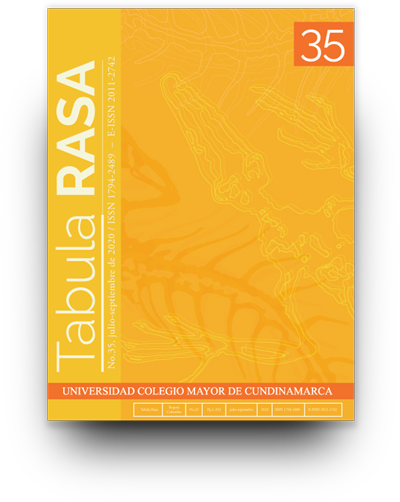The origins of the idea of "internal colonialism" in african-american communist Harry Haywood’s critical thinking : a chronicle of a conversation with Gwendolyn Midlo Hall.
Los orígenes de la idea del "colonialismo interno" en el pensamiento crítico del comunista afroamericano Harry Haywood : crónica de una conversación con Gwendolyn Midlo Hall.
Show authors biography
Harry Haywood (1898-1985) was a prominent African-American communist, who drawing from the understanding of racism as an essentially economic problem argued that African-American population was treated as an ‘internal colony’, an idea he portrayed in his well-known work Negro Liberation (1948). However, this root of ‘internal colonialism’ notion in Black Marxisms has been disregarded by the Latin American school led by Pablo González Casanova and Rodolfo Stavenhagen, who assign it to American sociologist Charles Wright Mills in late 50s. This article presents a chronicle of a conversation on this
and other related issues held by Haywood’s widow and American historian Gwendolyn, an emerita professor of Latin American and Caribbean History at Rutgers University and Michigan State University.
Article visits 215 | PDF visits 93
Downloads
- Amin, S. (2009). El socialismo en el siglo XXI. Reconstruir la perspectiva socialista. Madrid: Iepala.
- Bay Area Study Group (1979). On the Roots of Revisionism. A Political Analysis of the International Communist Movement and the CPUSA 1919-1945. San Francisco: Revolutionary Road.
- Comintern (1975) [1928-1930]. The 1928 and 1930 Comintern Resolutions on the Black National Question in the United States. Washington D.C.: Revolutionary Review Press.
- Cruse, H. (1962). Revolutionary Nationalism and the Afro-American. Studies on the Left, 2(3), 12-25.
- Cueva, A. (2018) [1979]. Problemas y perspectivas de la teoría de la dependencia. En G. Herrera Mosquera (Coord.). Antología del pensamiento crítico ecuatoriano (pp.37-62). Buenos Aires: Clacso.
- Dagnini, J. K. (2008). Marcus Garvey: A Controversial Figure in the History of Pan-Africanism. The Journal of Pan African Studies, 2(3), 198-208.
- Delany, M. R. (1993) [1852]. The Condition, Elevation, Emigration, and Destiny of the Colored People of the United States. Baltimore: Black Classic Press.
- González Casanova, P. (2006). El colonialismo interno (una redefinición). En A. Borón, J. Amadeo & S. González (Comps.). La teoría marxista hoy. Problemas y perspectivas (pp. 409-434). Buenos Aires: Clacso.
- Gandarilla, J. (2018). Notas sobre la construcción de un instrumento intelectivo. El «colonialismo interno» en la obra de Pablo González Casanova. Pléyade, 21, 141-162.
- Goldner, L. (2004). Introduction to the Johnson-Forest Tendency. http://breaktheirhaughtypower.org/introduction-to-the-johnson-forest-tendency-and-thebackground-to-facing-reality/
- Grosfoguel, R. (2018). ¿Negros marxistas o marxismos negros?: una mirada descolonial. Tabula Rasa, 28, 11-22. https://doi.org/10.25058/20112742.n28.1
- Haywood, H. (1978). Black Bolshevik. Autobiography of an Afro-American Communist. Chicago: Liberator Press.
- Haywood, H. (1948). Negro Liberation. New York: International Publishers.
- Haywood, H. & Hall, G. M. (1966). Is the Black Bourgeoisie the Leader of the Black Liberation Movement? Soulbook, 2(1), 70-75.
- Henry, P. (2009). Blyden y Firmin. La filosofía afrocaribeña, En E. Dussel, E. Mendieta & C. Bohórquez (Eds.). El pensamiento filosófico latinoamericano, del Caribe y «latino» (1300-2000). Historia, corrientes, temas y filósofos, (pp. 237-238). México: Siglo XXI.
- James, C.L.R (1984) [1939]. Discussions with Trotsky. En At the Rendevouz of Victory, Londres: Allison & Busby.
- James, L. (2015). George Padmore and Decolonization from Below. London: Palgrave. Kelley, R. D. G. (2002). Freedom dreams: The black radical imagination. Boston: Beacon Press.
- Lee, P. (1982). Heroes of our Revolution: James A. La Guma (1894-1961), Dawn: Monthly Journal of Umkhonto we Sizwe, 6(3), 34-38.
- Lenin, V. (1973) [1920]. Esbozo inicial de las tesis sobre los problemas nacional y colonial para el II Congreso de la Internacional Comunista. En Obras escogidas, tomo XI (1920-1921) (pp. 53-56). Moscú: Progreso.
- Lenin, V. (1973) [1917]. Estadística y sociología. En Obras escogidas, tomo VI (1916-1917) (pp. 80-82). Moscú: Progreso.
- Mills, C. W. (1963) [1959]. The Problem of Industrial Development. En L. Horowitz (Ed.). Power, Politics and People: The Collected Essays of C. Wright Mills (pp. 150-183). New York: Oxford University Press.
- Painter, N. I. (1986). [1976]. Exodusters. Black Migration to Kansas after Reconstruction. Lawrence: University Press of Kansas.
- Pinderhughes, C. (2011). Toward a New Theory of Internal Colonialism. Socialism and Democracy, 25(1), 235-256.
- Robinson, C. (2000) [1983]. Black Marxism. The Making of the Black Radical Tradition. London: Zed Press.
- Torres Guillén, J. (2014). Dialéctica de la imaginación. Pablo González Casanova, una biografía intelectual. Ciudad de México: La Jornada/Demos.
- Washington, B. T. (2009) [1901]. Up from Slavery: An Autobiography. Portland: The Floating Press.




